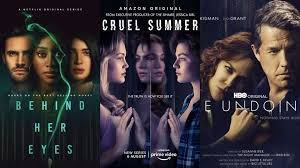Psychological vs. Action Thrillers: Which Keeps You on the Edge More?
Explore the heart-racing worlds of psychological and action thrillers. Which truly keeps you on the edge more? Discover the differences, emotional impact, and what makes each genre unforgettable.
Thrillers are a cornerstone of cinema and literature, built to provoke, excite, and immerse audiences in intense, suspenseful experiences. Among the vast spectrum of thriller genres, psychological and action thrillers stand out as the most gripping and adrenaline-inducing subtypes. But the burning question remains: Psychological vs. Action Thrillers — which keeps you on the edge more?
This article delves deep into both genres, exploring their core elements, audience reactions, emotional impacts, and even how different cultures like Bollywood and Hollywood adapt these stories. We’ll also tie in scientific and emotional factors, including how thrillers affect our brain chemistry and relate to current technological trends in storytelling.
What is a Psychological Thriller?
Definition and Core Elements
A psychological thriller focuses on the unstable or delusional psychological states of its characters. Instead of depending on explosions or high-speed chases, these stories thrive on tension, mind games, and character-driven plots. Think of films like Black Swan, Gone Girl, or The Silence of the Lambs.
Emotional & Mental Impact
Psychological thrillers excel in getting under your skin. They tap into deep fears — paranoia, betrayal, mental instability — and make you question reality. According to neuroscientific research, such narratives trigger activity in the prefrontal cortex, the area of the brain responsible for decision-making and emotional regulation.
Audience Engagement
Because psychological thrillers demand critical thinking and emotional engagement, they tend to stay with the audience long after the screen fades to black. The twists, ambiguity, and introspection leave a lasting impression.
What is an Action Thriller?
Definition and Core Elements
Action thrillers rely on physical conflict, high-stakes situations, and dynamic pacing to create suspense. These include movies like John Wick, Mad Max: Fury Road, or Die Hard. Expect fights, car chases, time-sensitive missions, and non-stop momentum.
Physical & Emotional Impact
Watching action thrillers triggers the release of adrenaline and endorphins, which simulate a fight-or-flight response. According to the Journal of Media Psychology, action thrillers stimulate physical reactions like increased heart rate, which enhance excitement and emotional involvement.
Audience Engagement
These thrillers are effective at captivating attention with fast-paced visuals and climactic sequences. While perhaps not as introspective as psychological thrillers, action thrillers deliver instant gratification and energy.
Bollywood vs. Hollywood: Thrillers Across Cultures
Hollywood’s Approach
Hollywood leans into high production value, complex scripts, and genre-blending. Psychological thrillers often intersect with horror (Shutter Island) or crime dramas (Zodiac), while action thrillers embrace CGI and spectacular stunt work.
Bollywood’s Evolution
Bollywood is known for its emotional depth, and recent years have seen a rise in intelligent thrillers. Films like Andhadhun and Talaash lean into psychological tension, while War or Baby offer slick action thrillers.
Cross-Genre Borrowing
Globalization has blurred the lines. Bollywood is adapting Western pacing and plot complexity, while Hollywood experiments with culturally rich narratives. This cross-pollination enhances both psychological and action thrillers, offering global audiences a hybrid storytelling experience.
The Neuroscience of Thrills: How These Genres Affect Our Brain
Endorphins and Dopamine
Action thrillers activate dopamine and endorphin release due to high-intensity scenes. This makes viewers feel euphoric and energized.
Cortisol and Psychological Tension
Psychological thrillers elevate cortisol levels — the stress hormone — due to their emotionally charged and often disturbing storylines. This mimics real psychological distress, keeping you mentally engaged.
Long-term Effects
Studies have shown that psychological thrillers have a higher impact on memory retention and emotional recall than action thrillers. This makes them more mentally stimulating but also emotionally draining.
The Rise of Intelligent Thrillers in the Age of AI and Data Analytics
AI-Driven Storytelling
With the rise of AI in entertainment, storytelling is becoming increasingly data-driven. Algorithms now analyze viewer preferences to deliver tailored thriller experiences. For instance, Netflix’s recommendation engine uses behavioral data to push psychological or action thrillers based on previous emotional engagement.
Automation in Content Production
Automation tools can now help generate scripts, predict plot success, and even simulate emotional arcs. Psychological thrillers particularly benefit from this trend as emotional pacing and complexity become easier to refine.
Which Genre Truly Keeps You on the Edge?
It Depends on the Viewer
If you’re someone who enjoys mental gymnastics, psychological thrillers will likely leave a deeper impact. If you crave instant excitement and high-stakes scenarios, action thrillers deliver better.
Hybrid Models
The best modern thrillers often combine both genres. Films like Inception or Tenet merge psychological complexity with action-packed sequences, offering the best of both worlds.
Audience Insights
According to a 2023 viewer engagement study by ScreenRant, psychological thrillers had 35% higher post-viewing discussion and rewatch value, whereas action thrillers scored 40% higher in immediate satisfaction and visual enjoyment.
When it comes to the ultimate thriller experience, psychological and action thrillers offer distinct yet equally powerful emotional journeys. Psychological thrillers challenge your mind and emotions, while action thrillers provide an adrenaline rush and visual spectacle.
The rise of intelligent entertainment tools powered by AI and data analytics ensures that both genres will continue to evolve in ways that keep us on the edge of our seats — mentally or physically. Whether you prefer the cerebral twist of a psychological thriller or the kinetic chaos of an action-packed adventure, there’s no doubt that thrillers are here to stay, reinventing the art of suspense in our modern age.
FAQ: Psychological vs. Action Thrillers
1. What makes a thriller “psychological”?
A psychological thriller focuses on the inner thoughts, fears, and mental states of characters, often creating suspense through mind games and emotional tension.
2. Are psychological thrillers scarier than action thrillers?
They can be, especially on a mental and emotional level. Unlike action thrillers, which rely on physical danger, psychological thrillers tap into primal fears and existential dread.
3. Can a movie be both an action and psychological thriller?
Absolutely. Many modern films blend both genres to provide a more dynamic experience. Examples include Inception, Oldboy, and The Bourne Identity.
4. How do these thrillers affect our brain differently?
Action thrillers stimulate endorphins and adrenaline, while psychological thrillers trigger cortisol and deeper cognitive engagement.
5. Which genre is better for long-term engagement?
Psychological thrillers tend to have a stronger emotional and intellectual aftereffect, making them more memorable for many viewers.
6. Why do we enjoy thrillers at all?
Thrillers allow us to experience danger, suspense, and resolution in a controlled environment. This stimulates both our brains and emotions in unique, enjoyable ways.
Ready to choose your next thriller night? Whether you go for cerebral chills or explosive thrills, understanding what drives each genre can make your viewing experience even more satisfying.


